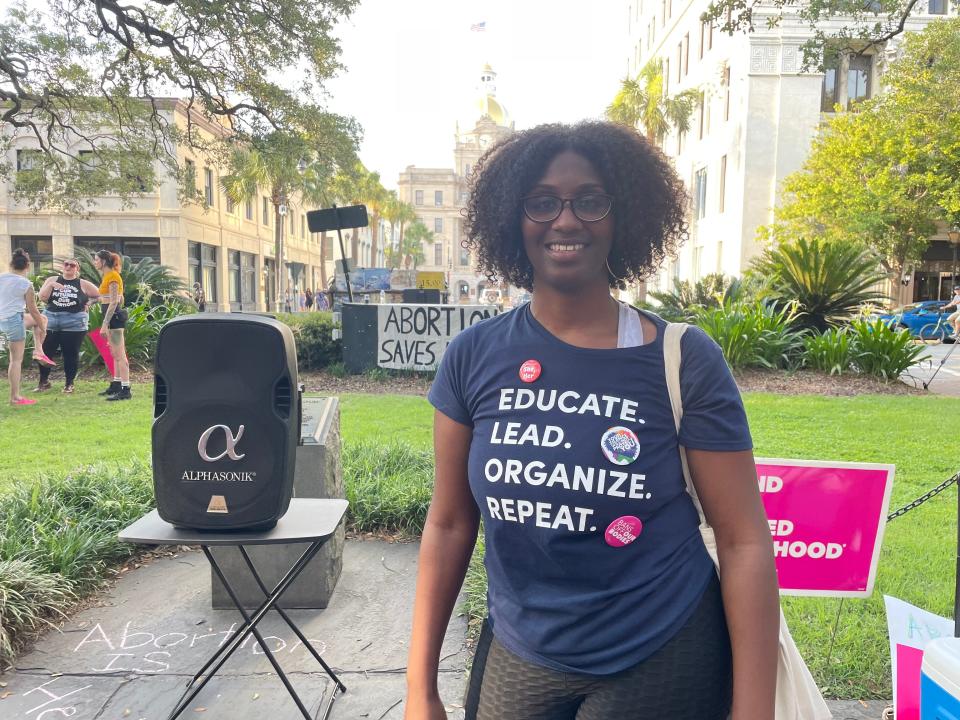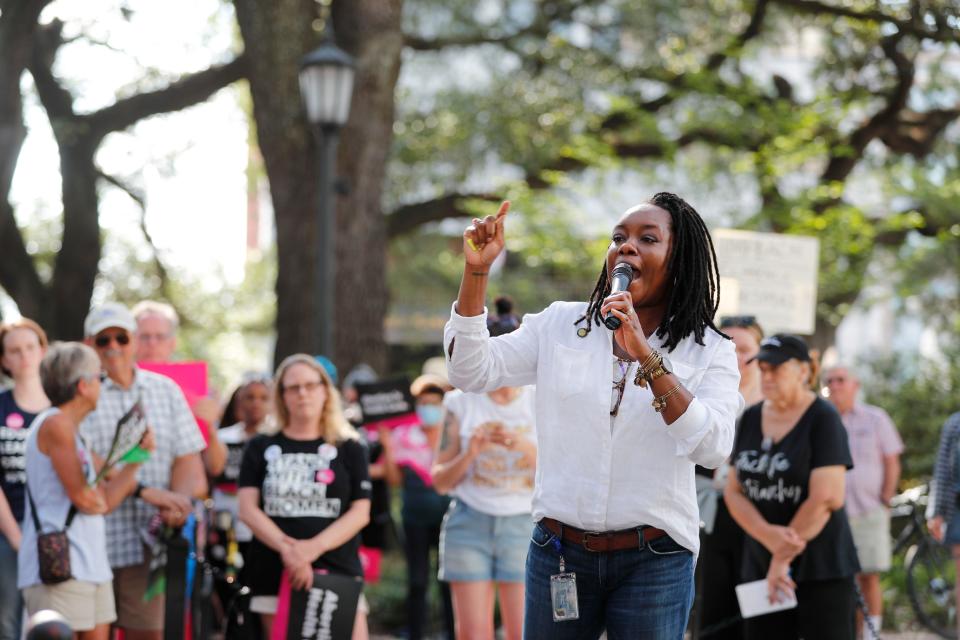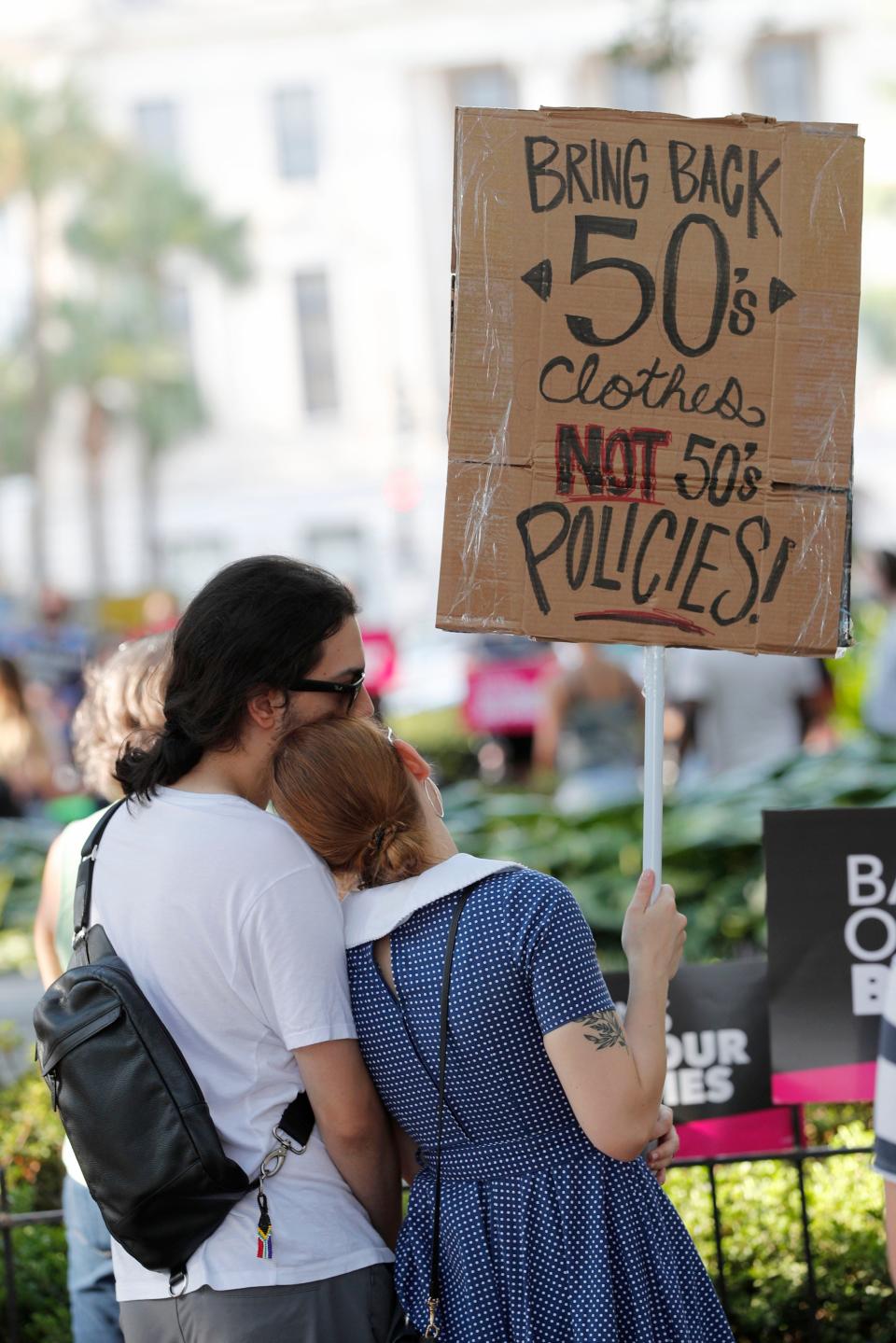'It's not going to end there': Savannah protests Supreme Court overturning of Roe v. Wade
This story was corrected to clarify remarks made by DA Jones at the rally
The overturning of Roe v. Wade, the 50-year-old case that upheld the constitutional right to an abortion, marked a watershed moment in the history of reproductive rights and triggered spates of protests throughout the country.
With the decades-old precedent gone, abortion restrictions now lie in the hands of the states, half of which will move to ban or severely restrict abortion access. In Georgia, a six-week ban on abortion is expected to take effect after the bill clears the appeals court.
In the city of Savannah, home to one of the few abortion clinics outside of the metro Atlanta area, residents took to the streets, rallying against the decision made by the highest court in the land.
What does overturning Roe v. Wade mean for Georgia? 5 things to know for Georgia after Roe v. Wade overturned
Georgia abortion law: Supreme Court Roe v. Wade decision means Georgia's abortion law can take effect quickly
Nearly 300 protestors gathered in Johnson Square at 5 p.m. Friday. Humidity hung oppressively in the air.
People of all ages held signs declaring reproductive justice for all and asserting abortion as health care. Sweat glistened off protestors' unsmiling faces as their screams sprung free from their mouths.
"My body, my choice," they shouted, as drums and tambourines punctuated their words in the background. "Abortion is healthcare, we want it now!"
Counter-protesters were sent away by nonviolent, non-confrontational practices. Tourists who weaved through the crowd while shouting “Go Brandon!” — an alt-right slogan aimed at insulting Pres. Joe Biden — were ignored and iced out. The crowd had a singular purpose.
Vivienne Kerley-de la Cruz, campaigns director for Planned Parenthood Southeast, said folks are feeling a lot of rage from the Supreme Court decision.
"Many of us haven't lived in a time where abortion wasn't our constitutional right, and the loss of this bodily autonomy is really fueling a lot of anger and outrage," said Kerley-de la Cruz.
Savannah's alderwoman Keisha Gibson-Carter addressed the crowd, a mix of residents, local activists and city officials.
"An America where I was born female. An America where I was told I was free. But today a decision has been made for women across the land that says these days we are in bondage," said Gibson. "A threat to our bodies today is a threat to my race tomorrow. It’s a threat to my ability to earn a competitive wage. A threat to justice anywhere is a threat to justice everywhere."
'Angry, hurt and in shock': Shrinking abortion access in a post-Roe society will harm the most marginalized in Georgia

The Supreme Court Decision has several implications for Black Americans, especially in the South. Black women receive about one-third of all abortions in the country, the largest proportion of any racial group, according to the U.S. Centers for Disease Control and Prevention.
The CDC also reports that Black women make up an even larger share of abortion seekers in Georgia at 65%. Coupled with the state's staggering maternal mortality rate, cutting abortion access could lead to an even greater crisis.
"Black women are oppressed people when you think of the hierarchy. And then we're so marginalized to the point that Black women will have a hard time finding accessible abortion," said Ni'Aisha Banks, a Savannah resident at the rally. "Because white people, they're able to travel and go other places. For Black women, it's going to be much harder for us."

Chatham County’s top prosecutor, District Attorney Shalena Cook Jones, who was also among the elected officials present at the demonstration, earned riotous applause from the tightly gathered crowd as she declared bodily autonomy as an absolute right in a free country.
“The decisions that came down in the Dobbs case today set us back hundreds and hundreds of years,” Jones said, referring to Dobbs v. Jackson Women's Health Organization, the case at the center of the Supreme Court's decision to overturn Roe.
Speaking exclusively to the Savannah Morning News following her impassioned speech to the crowd, Jones vowed that she would not prosecute cases that don't risk public health or safety. Abortions do not violate either, she said. Charges could come by way of the soon-to-be-law "Fetal Heartbeat Bill," what most anti-abortion activists call the six-week ban, which will outlaw abortions past the six-week mark.
“I plan to exercise my prosecutorial discretion to prosecute those laws and offenses that pose the greatest risk to public safety and public health. So, for example, we need to be focusing on serious violent crime, ending gun violence and gang violence. We need to focus our already limited resources on those,” Jones told the News.
Most pregnancies are not discovered until after six weeks, meaning a majority of abortions currently allowed would become illegal. In the state of Georgia, about 57% of abortions are performed after that gestational time period. The bill would allow exceptions for medical emergencies and police-reported rape or incest under 20 weeks.
The closest state a woman could travel to for a legal abortion after six weeks would be North Carolina, which currently allows abortions up to 20 weeks.
However, with federal protections gone, the parameters around legal abortion access can change swiftly as political leanings within state legislatures shift as well.
Florida, which has traditionally been a safe-haven of the South for abortion seekers, could see a 15-week ban take effect in July if the bill clears legal challenges.
As a result, abortion seekers in the region will likely have to travel further, spend more money and/or seek more dangerous alternatives in order to have an abortion.
Is abortion banned in Georgia? Georgia was a 'safe haven' for out-of-state abortion seekers. But where will they go now?
Magnolia Poeling, a 17-year-old protestor, declared the overturn as evangelical supremacy versus oppressed people.
The crowd cheered as she stepped up to the mic under looming live oak trees and read from an essay she wrote two years ago in fear of this moment in American history.
"It is extremely heartbreaking and it feels like I'm in a position where I feel so powerless and beaten down," Poeling said. "I envisioned my future with this idea that I was going to be this next generation that would have it different. So, to see that it's just going to go back in time is really heartbreaking."

With 50 years of constitutional precedent gone, many young people will come of age with fewer rights than their mothers and grandmothers.
Anger and fury. That’s what filled Magen Peigelbeck and Felicia Gibson when they saw the final opinion of the Dobbs Supreme Court case today.
“I'm not sure what America we live in right now,” Peigelbeck said.
The women, who attended in roller-skates and full roller derby protective gear, said Justice Clarence Thomas’ – a Savannah native – opinion let them know the repeal of Roe is just the beginning for conservatives.
“It's absolutely the tip of the iceberg. They're not just looking at (outlawing) abortion, they’re looking at contraception. They're looking at gay rights. They're looking at so many things beyond abortion,” Gibson said. “It's women's rights, but it's not going to end there.”
Nancy Guan is the general assignment reporter covering Chatham County municipalities. Reach her at nguan@gannett.com or on Twitter @nancyguann.
This article originally appeared on Savannah Morning News: Roe v Wade protests in Savannah, people rally for abortion

